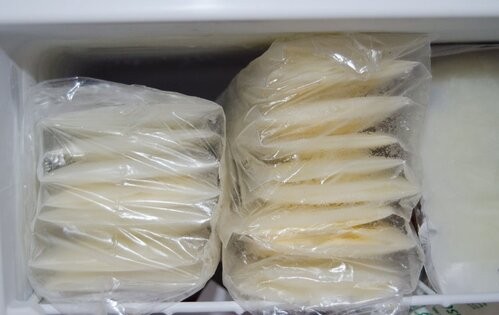What to Know About Breastfeeding
The idea of breastfeeding can be intimidating for some moms. Not only do you have a baby, but you’re also responsible for that baby’s nutrition – and your body is the source of his milk. His food comes straight from you.
Talk about responsibility!
Every mother must decide if she wants to breast or bottle feed her baby. While most professionals agree that breastfeeding is the way to go, there’s no shame in formula feeding. For some mothers, formula feeding is the safest option. If you have questions about the better option for you, be sure to talk to your doctor to get the best advice for you and your baby.
Breastfeeding is “natural,” so many new moms think it will be easy. For some moms it is easy: their babies quickly learn to latch, and the moms don’t have any problems. But for other moms it’s harder, and many find they need help. That’s ok! It can take time to learn the most effective way for you to breastfeed, and the process is a little different for every mom. And if you’re struggling, your doctor should be able to recommend lactation consultants who can help.
Breastfeeding can be tough, but it can also create some of the sweetest moments you share with your little one!
We’ve gathered some helpful information and tips for breastfeeding so that you can feel more confident as you’re learning to navigate new motherhood. We hope this guide helps you!
What are the Benefits of Breastfeeding Your Baby?
As we mentioned, most professionals recommend breastfeeding for many reasons. If you’re trying to decide if you want to nurse or bottle-feed your baby, consider some of these great benefits of breastfeeding.
Talk about responsibility!
Every mother must decide if she wants to breast or bottle feed her baby. While most professionals agree that breastfeeding is the way to go, there’s no shame in formula feeding. For some mothers, formula feeding is the safest option. If you have questions about the better option for you, be sure to talk to your doctor to get the best advice for you and your baby.
Breastfeeding is “natural,” so many new moms think it will be easy. For some moms it is easy: their babies quickly learn to latch, and the moms don’t have any problems. But for other moms it’s harder, and many find they need help. That’s ok! It can take time to learn the most effective way for you to breastfeed, and the process is a little different for every mom. And if you’re struggling, your doctor should be able to recommend lactation consultants who can help.
Breastfeeding can be tough, but it can also create some of the sweetest moments you share with your little one!
We’ve gathered some helpful information and tips for breastfeeding so that you can feel more confident as you’re learning to navigate new motherhood. We hope this guide helps you!
What are the Benefits of Breastfeeding Your Baby?
As we mentioned, most professionals recommend breastfeeding for many reasons. If you’re trying to decide if you want to nurse or bottle-feed your baby, consider some of these great benefits of breastfeeding.

1. Helps Prevent Illness
One of the most miraculous things about breastfeeding is the health benefits for your baby. Your baby’s saliva sends signals to your body so that your breastmilk composition levels adapts depending on your baby’s needs. Your milk’s nutrient levels and antibodies adjust so that it’s customized just for your baby.
This is also evidence that breastfeeding is effective in helping your baby fight off infections, reducing the risk of asthma and sudden infant death syndrome (SIDS), and in keeping your baby from developing other illnesses and conditions later in life.
2. Close Contact
Skin-to-skin contact is an important benefit to breastfeeding. A newborn especially needs to feel that close physical connection to his mother. This close contact provides a sense of comfort and safety which can, in turn, help keep your baby calm, encourage regular sleep patterns, and even boost his mood.
One of the most miraculous things about breastfeeding is the health benefits for your baby. Your baby’s saliva sends signals to your body so that your breastmilk composition levels adapts depending on your baby’s needs. Your milk’s nutrient levels and antibodies adjust so that it’s customized just for your baby.
This is also evidence that breastfeeding is effective in helping your baby fight off infections, reducing the risk of asthma and sudden infant death syndrome (SIDS), and in keeping your baby from developing other illnesses and conditions later in life.
2. Close Contact
Skin-to-skin contact is an important benefit to breastfeeding. A newborn especially needs to feel that close physical connection to his mother. This close contact provides a sense of comfort and safety which can, in turn, help keep your baby calm, encourage regular sleep patterns, and even boost his mood.

3. Boosts Your Mood and Your Health
That’s right! Breastfeeding not only boosts your baby’s mood and health, but also has positive effects on your mood and health as well.
There is evidence that breastfeeding can help reduce a woman’s risk of developing high blood pressure, urinary tract infections, osteoporosis, and certain diseases such as Type II Diabetes. Breastfeeding may also lower a woman’s risk of developing ovarian or breast cancer.
Breastfeeding can also help a mom lose her baby weight faster. Breastfeeding burns about 500 additional calories per day and helps the uterus to shrink.
Breastfeeding can decrease the risk and the effects of postpartum depression. This is often attributed to the hormone that’s released while breastfeeding called Oxytocin. Also called the “love hormone” or the “mothering hormone,” Oxytocin can increase relaxation, lower blood pressure, lower stress, and boost one’s mood.
Oxytocin is also the hormone that stimulates bonding in relationships, which leads us to our next point…
4. Bonding with Your Baby
One of the greatest things about breastfeeding is the bond you build with your little one. This doesn’t mean that women who formula feed can’t experience a close bond with their babies, but there is a special connection that breastfeeding moms experience.
That’s right! Breastfeeding not only boosts your baby’s mood and health, but also has positive effects on your mood and health as well.
There is evidence that breastfeeding can help reduce a woman’s risk of developing high blood pressure, urinary tract infections, osteoporosis, and certain diseases such as Type II Diabetes. Breastfeeding may also lower a woman’s risk of developing ovarian or breast cancer.
Breastfeeding can also help a mom lose her baby weight faster. Breastfeeding burns about 500 additional calories per day and helps the uterus to shrink.
Breastfeeding can decrease the risk and the effects of postpartum depression. This is often attributed to the hormone that’s released while breastfeeding called Oxytocin. Also called the “love hormone” or the “mothering hormone,” Oxytocin can increase relaxation, lower blood pressure, lower stress, and boost one’s mood.
Oxytocin is also the hormone that stimulates bonding in relationships, which leads us to our next point…
4. Bonding with Your Baby
One of the greatest things about breastfeeding is the bond you build with your little one. This doesn’t mean that women who formula feed can’t experience a close bond with their babies, but there is a special connection that breastfeeding moms experience.

5. It’s Free – and Readily Available
Another benefit to breastfeeding is – it’s free! The US Surgeon General reported in 2019 that the cost to formula feed a baby can range from $1200 - $1500 a year. And like many items these days, the costs are increasing (with some areas even reporting shortages). So breastfeeding, if you are able, will save you some money.
Breastfeeding can be more convenient than formula feeding as well – especially if you’re traveling or even out for a day with friends. You don’t have to worry about packing bottles, water, and formula to mix or in keeping pre-made formula at a certain temperature.
Of course there is the option to pump and store breastmilk. This option is a great way to ensure your baby has milk while you’re away, or if you prefer to bottle feed your baby while you’re out. Bonus: pumping can also help increase your milk production.
(Tip: Your body will produce more milk when your breasts are empty. Milk production decreases when they are storing too much. Your body produces more milk the more often you pump or feed.)
For storing your milk:
· Use either glass bottles or breast milk storage bags to store your milk. They are made for freezing breast milk.
· Breast milk can be kept at room temperature, not exceeding 77° F, but only for a few hours.
· Ideally, breast milk should be stored in the refrigerator and can be used for up to four days after pumping. After four days, if you haven’t used the milk, store it in the freezer.
· Breast milk can be stored in the freezer for 6-12 months. Six months is best, but the milk will still be fit to use up to twelve months.
Another benefit to breastfeeding is – it’s free! The US Surgeon General reported in 2019 that the cost to formula feed a baby can range from $1200 - $1500 a year. And like many items these days, the costs are increasing (with some areas even reporting shortages). So breastfeeding, if you are able, will save you some money.
Breastfeeding can be more convenient than formula feeding as well – especially if you’re traveling or even out for a day with friends. You don’t have to worry about packing bottles, water, and formula to mix or in keeping pre-made formula at a certain temperature.
Of course there is the option to pump and store breastmilk. This option is a great way to ensure your baby has milk while you’re away, or if you prefer to bottle feed your baby while you’re out. Bonus: pumping can also help increase your milk production.
(Tip: Your body will produce more milk when your breasts are empty. Milk production decreases when they are storing too much. Your body produces more milk the more often you pump or feed.)
For storing your milk:
· Use either glass bottles or breast milk storage bags to store your milk. They are made for freezing breast milk.
· Breast milk can be kept at room temperature, not exceeding 77° F, but only for a few hours.
· Ideally, breast milk should be stored in the refrigerator and can be used for up to four days after pumping. After four days, if you haven’t used the milk, store it in the freezer.
· Breast milk can be stored in the freezer for 6-12 months. Six months is best, but the milk will still be fit to use up to twelve months.

While there are many benefits to breastfeeding your baby, ultimately it’s up to you to determine the best way to feed your baby. Your doctor can answer questions to help you figure out what’s best for you, and she can recommend lactation consultants if you are having a hard time breastfeeding and need some help. Many experts recommend breastfeeding at least six months and up to a year, but your baby can get some benefits from breastfeeding even if it’s for a shorter time.
Connect With Us!
One by One Ministries is devoted to providing you with useful motherhood advice, but did you also know that we offer mentorship programs for mothers?
We believe that every mother needs friends she can lean on and trust as she navigates the ever-changing, ever-surprising journey of motherhood, and it’s our desire that every mother finds great community to help support her mentally, physically, emotionally, and spiritually.
Interested in becoming a part of our community? Click here to learn more and connect with us here!
Connect With Us!
One by One Ministries is devoted to providing you with useful motherhood advice, but did you also know that we offer mentorship programs for mothers?
We believe that every mother needs friends she can lean on and trust as she navigates the ever-changing, ever-surprising journey of motherhood, and it’s our desire that every mother finds great community to help support her mentally, physically, emotionally, and spiritually.
Interested in becoming a part of our community? Click here to learn more and connect with us here!
Posted in Mom Tips
Categories
Recent
Archive
2026
February
2025
January
March
December
She's Been Everything I NeededThis Program Really Did Save a LifeI Want to Be Whole AgainIf You Sign Up, Know You're Signing Up for SuccessI Knew Mentoring with OBO was Something I Had to DoShe's a Tremendous Joy for MeShe's Been So AwesomeShe Is a Great Support SystemThankful to Be Able to Support HerMy Job Is to Plant a SeedIt Was a Chance for Me, as a Military Wife, to Support Other Military Wives
2024
January
February
April
June
October
2023
January
March
April
May
June
July
September
October
November
December

No Comments